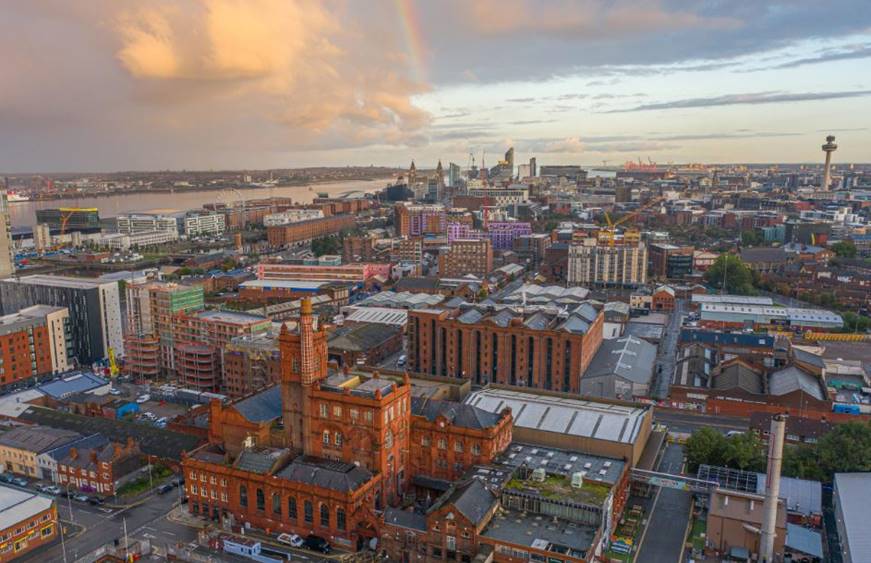
Latest
Masterplan for The Baltic Triangle endorsed, including the addition of a new train station
5 years ago

A new masterplan for one of the UK’s creative hot-spots has been endorsed – which could soon lead to Liverpool’s first new train station and public park of the 21st century.
Liverpool City Council’s Cabinet has approved the Baltic Triangle’s draft Spatial Regeneration Framework (SRF) – which has beendeveloped over the past 12 months to guide the historic area’s future development.
Once a major warehouse and production hub moulded by the city’s empire building dock economy before it collapsed, the area has undergone a £250m boom since its first development framework was created by the city council in 2007.

Fuelled by a blossoming creative and digital sector – overseen by the Baltic Creative and Baltic Triangle Area CICs – the area is now home to more than 500 businesses employing more than 3,000 people.
But the Baltic Triangle, which covers 93 acres of mixed-use land on the southern fringe of the city centre into the Dingle and Toxteth, has also housed a doubling in its population since 2010.
The new masterplan, led by consultants LDA Design who also oversaw its public consultation, aims to set out guidelines on the remaining available land to balance the needs of business growth and residential development.
Key recommendations within the Baltic Triangle SRF includes:
- Support for a new rail station at St James Street (closed in 1917)
- Creating a new public park – Baltic Park
- Enhancing connectivity, specifically pedestrian and cycle routes
- Creating green corridors, linking into the city’s £3.4m Urban GreenUp project
- Protecting open spaces and setting open space design guidelines
- Encouraging a balanced mix of housing types and homes for families
- Ensuring buildings have active ground floor uses
- The potential for a Conservation Area
- Implementing the Agent of Change policy
The SRF also identified the following four Areas of Change and has set design guidelines for each that deals with considerations such as scale and design, connectivity, heritage and green infrastructure:
- Police HQ and Heaps Mill
- Wapping Goods Terminal
- Flint Street South
- Cains Brewery Village and Hill Street Corridor

The Baltic SRF will now be used in guiding planning applications in the area. It will be endorsed as a Supplementary Planning Document following adoption of Liverpool’s 15 year Local Plan, which is expected to come into force in late 2021.
A planning inspector is currently assessing Liverpool’s Local Plan, the public review for which ends today. A public consultation on the inspectors approved amendments to the plan is expected to be held in the Spring. If no further changes are made, the Local Plan will then be presented to the council’s Cabinet to finally endorse and adopt.
Mark Lawler, Manging Director of Baltic Creative CIC, said:
“Baltic Creative CIC is delighted to see these SRF plans launch in Baltic. As the city deals with the COVID crisis and the recovery into 2021, we know the business community in the Baltic will play a key role in stimulating new jobs and growth.
“The SRF highlights the importance of the Business Community and its role in the future growth of the Baltic Triangle area. We at Baltic Creative CIC will continue to provide affordable, accessible commercial space for our Creative and Digital Community right here in the heart of the Baltic Triangle, as we move through and out of the crisis supporting the ambition of the SRF.”

Mayor of Liverpool Joe Anderson said:
“The Baltic Triangle is a great Liverpool success story but the time has come for a new chapter to take it to the next level.
“This new masterplan sets out some bold ideas and projects to create a healthy, vibrant place to work and live, such as the train station and park, and with the right investment it will help guide its growth for the decades to come.
“Consultation with businesses and residents has been crucial to how this plan was shaped. They will also be vital to its successful implementation, and I thank everyone for their input and commitment to making the Baltic the best possible place to invest and work in.
“The area’s position as one of Britain’s fastest-growing digital and creative hubs is something the city takes great pride in and we want to nurture this to ensure it can help fuel Liverpool’s growth out of the Covid crisis over the coming years.”
Liam Kelly, Chair of The Baltic Triangle Area CIC, said:
“It’s extremely welcomed news that the council’s cabinet has approved these plans. This is a significant step in the right direction for game-changing plans such as the train station, but also more immediate solutions to challenges the area faces with development pressures – such as Agent of Change.
“These principles in particular are key to protecting the iconic night time industry that has contributed so significantly to the area’s identity. The recent pandemic has further highlighted to us the importance of the limited green spaces in the area, and the inclusion of the Baltic Park will support the fantastic work already underway bringing people together on the Baltic Green.”









 Subscribe
Subscribe Follow Us
Follow Us Follow Us
Follow Us Follow Us
Follow Us Follow Us
Follow Us Follow Us
Follow Us











